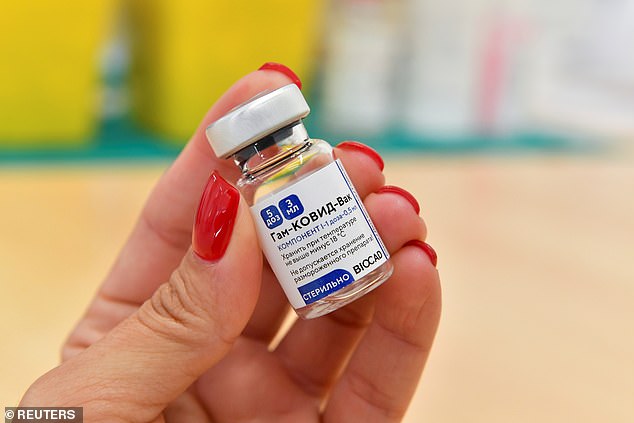Russians have been warned to limit their vodka consumption after receiving the Sputnik V jab, as the country registered the world’s first vaccine for animals.
The head of the Gamaleya Research Institute, which created Russia‘s coronavirus vaccine, has said Russians should not drink more than one and a half shots of vodka a day if they want its protection to remain effective.
Alexander Gintsburg said that the cells of the immune system ‘stop multiplying’ if there is a higher level of alcohol in the body.
‘Cells must multiply for antibodies to be produced,’ he added.
The average Russian drinks 110 shots of the national drink each year, but the figure is believed to be far higher for men.
Recipients of the Sputnik V vaccine were previously advised to abstain from alcohol for nearly two months before and after receiving the jab to avoid straining the body’s immune system.
Russians have been warned to limit their vodka consumption after receiving the Sputnik V jab, as the country registered the world’s first vaccine for animals [Stock image]
![The head of the Gamaleya Research Institute, which created Russia's coronavirus vaccine, has said Russians should not drink more than one and a half shots of vodka a day if they want its protection to remain effective. Alexander Gintsburg said that the cells of the immune system 'stop multiplying' if there is a higher level of alcohol in the body [Stock image]](https://i.dailymail.co.uk/1s/2021/03/31/11/41168244-9422205-image-a-30_1617184946954.jpg)
The head of the Gamaleya Research Institute, which created Russia’s coronavirus vaccine, has said Russians should not drink more than one and a half shots of vodka a day if they want its protection to remain effective. Alexander Gintsburg said that the cells of the immune system ‘stop multiplying’ if there is a higher level of alcohol in the body [Stock image]
Gintsburg’s warning came as Russia registered the world’s first vaccine for animals, named Carnivac-Cov.
‘The next stage [of the pandemic] is the infection of farm and domestic animals,’ the microbiologist said.
‘And when we protect humanity with the help of good vaccines within a year, pets will be infected by that time. And no one is going to get rid of their beloved pets.
Gintsburg said that the pathogen will continue to evolve and be present in communities.
‘One must be prepared for a long existence with this pathogen,’ he added.
Carnivac-Cov was developed by the Federal Centre for Animal Health, according to Russian media.
‘It is the world’s first and currently only coronavirus vaccine for animals,’ Konstantin Savenkov, head of the Federal Service for Veterinary and Phytosanitary Surveillance, a watchdog.
![Carnivac-Cov was developed by the Federal Centre for Animal Health, according to Russian media. Pictured: A rabbit receives an injection during the development of a covid vaccine for animals in Russia on December 9, 2020 [File photo]](https://i.dailymail.co.uk/1s/2021/03/31/11/41169768-9422205-image-a-32_1617185024906.jpg)
Carnivac-Cov was developed by the Federal Centre for Animal Health, according to Russian media. Pictured: A rabbit receives an injection during the development of a covid vaccine for animals in Russia on December 9, 2020 [File photo]
‘All the tested vaccinated animals developed antibodies to coronavirus in 100 per cent of cases,’ he claimed.
Military dogs have been vaccinated ahead of their appearance at a Red Square parade on May 9th to mark the anniversary of the end of the Second World War.
Virologist Dr Nadezhda Rakhmanina said: ‘This particular vaccine is needed, first of all, in fur farming.
‘Cases of mass deaths of fur-bearing animals abroad, including in Denmark, were described last year.
‘In general, fur-bearing animals are susceptible to many infectious diseases of humans, they even have a susceptibility to influenza.
‘These animals can get sick with the coronavirus en masse. So the vaccine is really needed.
However Rakhmanina was less certain about the need for a jab for pets.
![Demand for Russia's Sputnik V vaccine, currently among the world's most effective, is rising in Europe and elsewhere. The Kremlin said on Tuesday that President Vladimir Putin was in talks with France's Emmanuel Macron and Germany's Angela Merkel to discuss prospects for EU registration of the vaccine as well as shipments and joint production in EU nations [Stock image]](https://i.dailymail.co.uk/1s/2021/03/31/11/41169656-9422205-image-a-33_1617185082765.jpg)
Demand for Russia’s Sputnik V vaccine, currently among the world’s most effective, is rising in Europe and elsewhere. The Kremlin said on Tuesday that President Vladimir Putin was in talks with France’s Emmanuel Macron and Germany’s Angela Merkel to discuss prospects for EU registration of the vaccine as well as shipments and joint production in EU nations [Stock image]
‘Over the past year, it has not been proven that pets can be a source of Covid-19 infection for humans.
‘There are isolated cases of infection in cats, which have been described and proven. But there is no mass [evidence] yet.’
Demand for Russia’s Sputnik V vaccine, currently among the world’s most effective, is rising in Europe and elsewhere.
The Kremlin said on Tuesday that President Vladimir Putin was in talks with France’s Emmanuel Macron and Germany’s Angela Merkel to discuss prospects for EU registration of the vaccine as well as shipments and joint production in EU nations.
Russia has administered some 11.12million jabs of the virus among its more than 144.4million people but is struggling to combat high levels of vaccine hesitancy.
On Tuesday, the country recorded 8,162 new infections and 404 deaths. At least 4.49million cases of coronavirus have been reported in Russia since the pandemic began last year. A total of 96,817 people have died from the disease.
